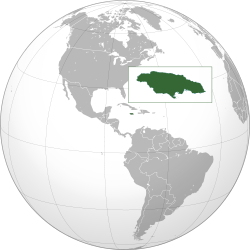The Jamaica Portal
Jamaica (/dʒəˈmeɪkə/ jə-MAY-kə; Jamaican Patois: Jumieka [dʒʌˈmie̯ka]) is an island country in the Caribbean Sea and the West Indies. At 10,990 square kilometres (4,240 sq mi), it is the third largest island—after Cuba and Hispaniola—of the Greater Antilles and the Caribbean. Jamaica lies about 145 km (90 mi) south of Cuba, 191 km (119 mi) west of Hispaniola (the island containing Haiti and the Dominican Republic), and 215 km (134 mi) south-east of the Cayman Islands (a British Overseas Territory). With 2.8 million people,0 Jamaica is the third most populous Anglophone country in the Americas (after the United States and Canada), and the fourth most populous country in the Caribbean. Kingston is the country's capital and largest city. Most Jamaicans are of Sub-Saharan African ancestry, with significant European, East Asian (primarily Chinese), Indian, Lebanese, and mixed-race minorities. Because of a high rate of emigration for work since the 1960s, there is a large Jamaican diaspora, particularly in Canada, the United Kingdom, and the United States. The country has a global influence that belies its small size; it was the birthplace of the Rastafari religion, reggae music (and such associated genres as dub, ska and dancehall), and it is internationally prominent in sports, including cricket, sprinting, and athletics. Jamaica has sometimes been considered the world's least populous cultural superpower. (Full article...) Selected article -The Jamaican honours system has developed as a unique entity since the passage of the National Honours and Awards Act by the Parliament of Jamaica in 1969 (Act No. 21 of 1969). The system is modelled largely on the British honours system, which was formerly conferred on Jamaicans. The Governor-General is the Chancellor of each order, membership of which is conferred by the Governor-General upon the advice of the Prime Minister of Jamaica. The sovereign is not, however, the sovereign of these orders, as in the case of the Order of Canada and the Order of Australia. In a sense, therefore, they are somewhat analogous to those distinctions awarded by certain of the Canadian provinces. (Full article...)Did you know (auto-generated)
Selected biography -Percival Noel James Patterson, ON, OCC, KC (born 10 April 1935), popularly known as P.J. Patterson, is a Jamaican former politician who served as the sixth Prime Minister of Jamaica from 1992 to 2006. He served in office for 14 years, making him the longest-serving prime minister in Jamaica's history. He was the leader of the People's National Party from 1992 to 2006. Patterson served as the Member of Parliament (MP) for the constituency of Westmoreland South Eastern from 1970 to 1980 (when he lost to Euphemia Williams of the Jamaica Labour Party) and again from 1989 to 1993. Following a constituency reorganization, he served as the MP for Westmoreland Eastern from 1993 to 2006. He retired from all of these positions in January 2006. (Full article...)General images -The following are images from various Jamaica-related articles on Wikipedia.
This is a Good article, an article that meets a core set of high editorial standards.
 The Gun Court is the branch of the Jamaican judicial system that tries criminal cases involving firearms. The court was established by Parliament in 1974 to combat rising gun violence, and empowered to try suspects in camera, without a jury. The Supreme Court, Circuit Courts, and Resident Magistrate's Courts function as Gun Courts whenever they hear firearms cases. There is also a Western Regional Gun Court in Montego Bay. Those convicted by the Gun Court are imprisoned in a dedicated prison compound at South Camp in Kingston. Until 1999, the Gun Court sessions were also held in the same facility. The long sentences of the Gun Court and its restrictions on the rights of the accused have given rise to constitutional challenges, some of which have been appealed to the Privy Council in London. These cases have resulted in some modifications to the court, but have upheld it on the whole. The Gun Court system has also been the target of criticism because of its lengthy delay in hearing cases, and the continuing rise in gun violence since its adoption. (Full article...)Selected picture - Jamaican singer Jimmy Cliff performing in 2012
Selected cuisines, dishes and foods - The festival or Jamaican festival are a kind of deep-fried bread, typical of Jamaican cuisine. Despite its slightly sweet taste, is served as a side dish to dishes such as fried fish, escovitch fish or jerk chicken. It is a dough made with wheat flour, Cornmeal, baking powder, salt, milk powder unflavored milk or evaporated milk, sugar and water, then fried in a neutral cooking oil and served hot. The finished festival should be crispy on the outside while soft and fluffy on the inside. (Full article...)
More did you know
Selected listsTopicsCategoriesRelated portals
WikiProjectsGeographical:
History and Society:
Tasks
Associated WikimediaThe following Wikimedia Foundation sister projects provide more on this subject:
More portals | ||||||||||||



















































